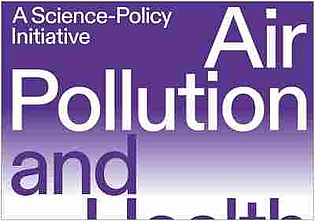News | Wednesday, 19 June 2019
Academies stress need for global action on harmful air pollution

Image: Lamm & Kirch
The National Academies of Sciences and Medicine from South Africa, Brazil, Germany, and the United States of America are calling for a new global compact to improve collaboration on the growing problem of harmful air pollution, and for governments, businesses and citizens to reduce air pollution in all countries. The academies launched their call with the publication of a science-policy statement, which was handed over on Wednesday, 19 June 2019, in a ceremony at the UN headquarters to senior UN representatives and high-level diplomats.
In the statement, the five National Academies are also jointly calling for immediate action from all levels of society. This includes a request for emissions controls in all countries and proper monitoring of key pollutants – especially PM2.5. PM2.5 is one of the smallest particulates in the air we breathe, which can enter and impact all organs of the body. The science academies specify the need for increased funding to tackle the problem and substantial investment in measures to reduce air pollution. This can also help to reduce climate change and contribute to meeting the goal of limiting average global warming to 1.5ºC.
With this statement, the academies provide further scientific input for the global climate action summit, which the UN Secretary General will hold in September this year and where air pollution and health will be an issue of great concern. The five National academies invite science academies, research institutes, universities and individual scientists worldwide to join the initiative and to strengthen research and science-policy activities in the area of “Air Pollution and Health”.
President Jörg Hacker of the German National Academy of Sciences Leopoldina says: “National Academies are uniquely placed to address complex issues such as the interplay between air pollution and health. Academies are independent fora where scientists from all disciplines come together to exchange and reflect upon their findings. Such a collaboration across disciplines is essential to find solutions to these problems.”
Unequivocal scientific evidence shows that air pollution affects human health across our entire lifespan. It can affect everyone, even unborn babies, with young, old and vulnerable people impacted the most. The health impacts include the premature deaths of at least 5 million people per year, as well as chronic health conditions like heart disease, asthma, COPD, diabetes, allergies, eczema and skin ageing. Air pollution also contributes to cancer, stroke and slows lung growth of children and adolescents. Evidence is growing that air pollution contributes to dementia in adults and impacts brain development in children.
Burning of fossil fuels and biomass for heat, power, transport and food production is the main source of air pollution. The global economic burden of disease caused by air pollution across 176 countries in 2015 was estimated to be USD 3.8 trillion. Measures, which could have positive impacts on reducing air pollution, are woefully underinvested in.
The academies state that both private and public investments are insufficient and do not match the scale of the problem. Air pollution is preventable. With sufficient action suffering and deaths from dirty air can be avoided. Clean air is as vital to life on earth as clean water. Air pollution control and reduction must now be a priority for all.
